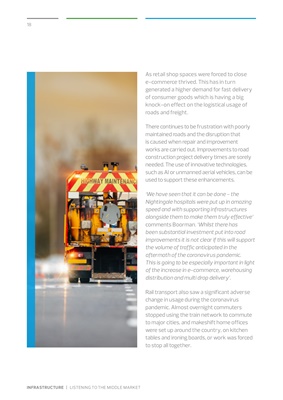
As retail shop spaces were closed e-commerce
was provided a prime opportunity to dominate.
This has in turn generated a higher demand
for fast delivery of consumer goods which is
having a big knock-on effect on the logistical
usage of roads and freight.
There continues to be frustration with poorly
maintained roads and the disruption that
is caused when repair and improvement
works are carried out. Improvements to road
construction project delivery times are sorely
needed. The use of innovative technologies,
such as AI or unmanned aerial vehicles, can be
used to support these enhancements.
'We have seen that it can be done - the
Nightingale hospitals were put up in amazing
speed and with supporting infrastructures
alongside them to make them truly effective,'
comments Boorman. 'Whilst there has
been substantial investment put into road
improvements it is not clear if this will support
the volume of traffic anticipated in the
aftermath of the coronavirus pandemic.
This is going to be especially important in light
of the increase in ecommerce, warehousing
distribution and multi drop delivery'.
Rail transport also saw a significant adverse
change in usage during the coronavirus
pandemic. Almost overnight commuters
stopped using the train network to commute
to the country's major cities, and makeshift
home offices were set up around the country,
on kitchen tables and ironing boards, or work
was forced to stop all together.
INFRASTRUCTURE | LISTENING TO THE MIDDLE MARKET
18